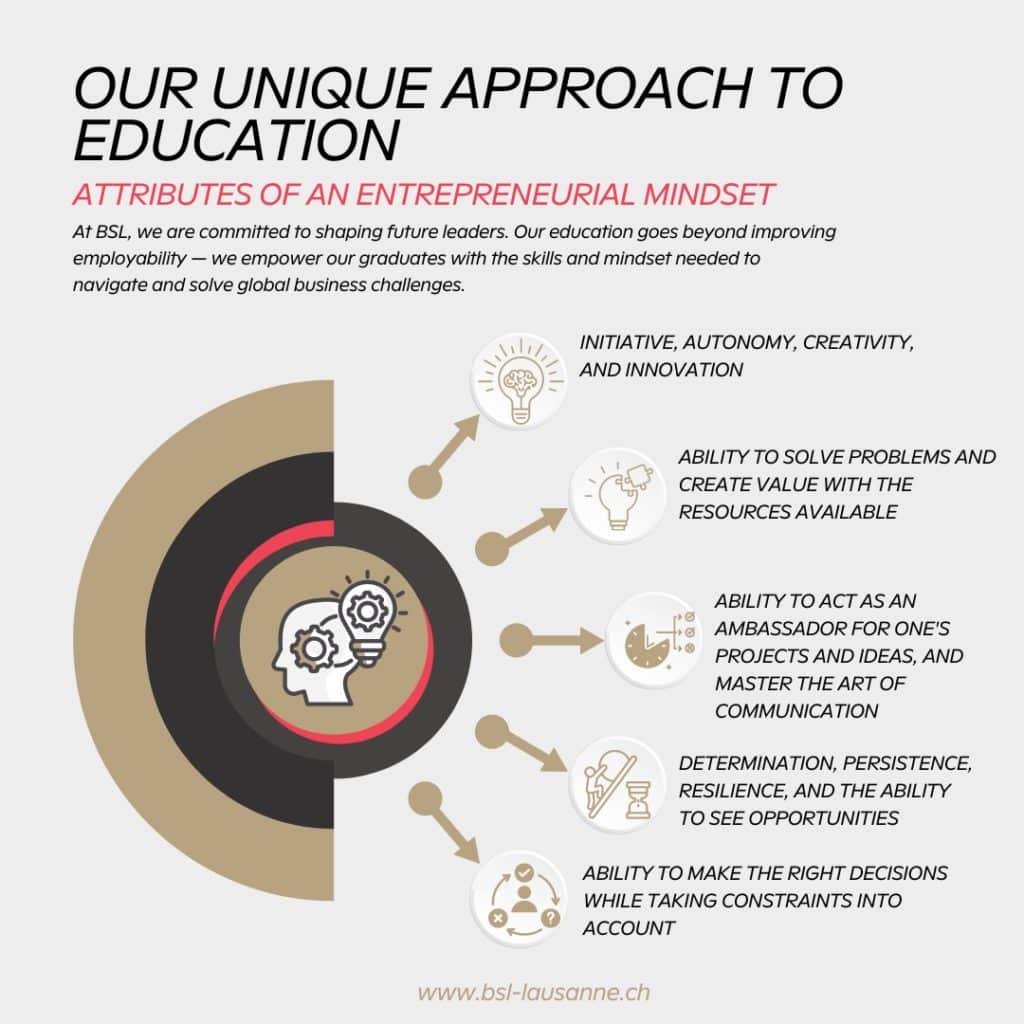
Dominique Bourqui has been an entrepreneur since her youth. She has set up and several companies, notably in the media sector, and founded a consulting firm for entrepreneurs. She still runs these companies today and she is also Chief Academic Officer at Business School Lausanne and Director of its doctoral school (DBA). In the September 25th edition of Tribune de Genève, She answered a few questions about the relevance of Business Administration courses, and more specifically of MBA (Master of Business Administration) degrees.
Where does the MBA come from?
The Harvard Business School in the USA created the first MBA in 1908, in response to a need expressed by companies in the wake of rapid industrialization leading to strong growth.
Read more
Over time, MBA training, constantly adapted, became synonymous with success in the business world and arrived in Europe at the end of the 50s. It is one of the few diplomas whose name and content are known in every country in the world. This is all the more remarkable as it is essentially a continuing education diploma, since it requires participants to have professional experience prior to admission.
Is the century-old MBA still useful today?
It’s true that there are other paths to success in today’s business world than the MBA. For example, I accompany a number of self-taught entrepreneurs in the creation, management and growth of their businesses. This has shown me just how much of an advantage it is to master advanced skills in finance, digital marketing or strategy.
Read more
An MBA is almost always the quickest way to acquire the knowledge and skills you need for a comprehensive understanding of business management. It’s the perfect way to advance your career or prepare for a possible future entrepreneurial activity. Our MBA programs, which aim to offer a holistic approach to management training, obviously evolve in line with the changes affecting the practice of business management. At Business School Lausanne, for example, we revise our programs every year. This may be minor or major, and lead to the introduction of new subjects and disciplines (hard skills). Our MBA, for example, includes courses on sustainable development, digitalization, data analysis and artificial intelligence. In terms of personal development, given the maturity and diversity of our students, the MBA is also a great program for acquiring leadership skills and personal growth (soft skills).
Who is the MBA for?
Delivered in English, the MBA welcomes three types of candidates.
Read more
Firstly, junior professionals who wish or are offered the opportunity to take on managerial responsibilities. The MBA enables engineers, for example, to translate their mastery of numbers into financial management, and to learn about other areas of business management that they have not had the opportunity to study or practice. Then there are the managers already in place who want to move on to greater responsibilities. At Business School Lausanne, we have a program for this population of accomplished professionals, the Executive MBA, which enables them, while keeping a job, to exchange ideas with their peers, encouraging the sharing of experience and critical debate. Finally, there are candidates with a more entrepreneurial profile, who come with a specific development project for the company employing them (intrapreneurship) or with a business creation project or idea in mind, and who wish to reduce the risk of a future entrepreneurial experience by building on solid theoretical and practical foundations. In our program, they are supervised by international professors who are not only academics, but also simultaneously practitioners, entrepreneurs, consultants or senior managers active in their field of specialization.
We often hear that it’s harder for women to get an MBA?
Really? Women often make. up more than half of our participants at Business School Lausanne
Read more
Our flexible, warm, demanding and personalized teaching environment, with direct access for our students to many experts, is ideally suited to the personal needs of all our learners. If you follow our social networks, you’ll see that, in particular, our female Alumnae are behind some of our greatest success stories.
What are the benefits of an MBA?
At Business School Lausanne, we pay particular attention to upskilling, i.e. the upgrading and updating of our participants’ managerial skills.
Read more
To achieve this, we rely in particular on the research carried out by the doctoral students and professors in our doctoral school, who conduct their research on business transformation at a level that goes beyond the transformation of one company in particular to provide solutions that will have an impact at the level of an industry in general. Doctoral research topics mainly concern sustainable development, digitalization, artificial intelligence and entrepreneurial methods and tools. We also attach the utmost importance to ensuring that the MBA enables our students to develop their own leadership skills, through specific courses, but also more generally through the organization of teaching, which gives pride of place to personal exchanges, debates and group work.
Is there a unique advantage to an MBA at Business School Lausanne? In addition to the content of our programs, which benefit from the latest knowledge and practices in business management resulting from research by BSL’s doctoral school, there is one point that we see as the signature of Business School Lausanne: the personalization of our courses.
Read more
Each MBA or Executive MBA participant works on a management report or entrepreneurial project at the end of the program. Our graduates all leave with a concrete project examined and validated by a panel of experienced practitioners in the field of innovation and entrepreneurship. In fact, the availability of our professors to advise on the personal projects included in our MBA program led one of our participants to say: “I chose BSL because it’s the best consulting machine around.”

Networking is also often mentioned as one of the benefits of an MBA course. What are your thoughts on this?
Networking is indeed a dimension targeted by all MBA programs worldwide. At Business School Lausanne, our vision is clear: we want to offer our students the opportunity to develop a dense and useful network in Switzerland. As a significant number of our graduates find opportunities or choose to pursue their careers in Switzerland, the BSL network is particularly relevant there.
Online MBA or on-campus MBA, which do you recommend?
If you can, come to Lausanne! The advantages of an on-campus MBA are incomparable.
Read more
On the one hand, it allows you to truly protect the time you devote to your training by isolating yourself in a setting conducive to exchange and learning. On the other hand, it gives you access to the resources available on campus: graduate projects, career center, program management, professors, guest speakers and events. Of course, we are well aware that professional life often has intense and unpredictable periods when it’s not possible to come to campus. That’s why all modules taught on campus can be taken simultaneously online via a hybrid learning system.
Does the MBA cover all the needs of today’s managers?
In my opinion, this is the most comprehensive training and the most suitable level for early and mid-career. We are, however, witnessing the emergence of new needs for senior managers and experienced entrepreneurs.
Read more
For these senior profiles, it’s a question of solving a problem they encounter in their company, and for which neither the state of research – and therefore of available knowledge – nor practice provide satisfactory solutions. They solve this problem through research that will be applicable in the business world, and in so doing they obtain a Doctorate in Business Administration (DBA) from BSL. Like MBA training, the DBA program represents an opportunity for personal and professional development through collaboration with peers in a vibrant international research community.
